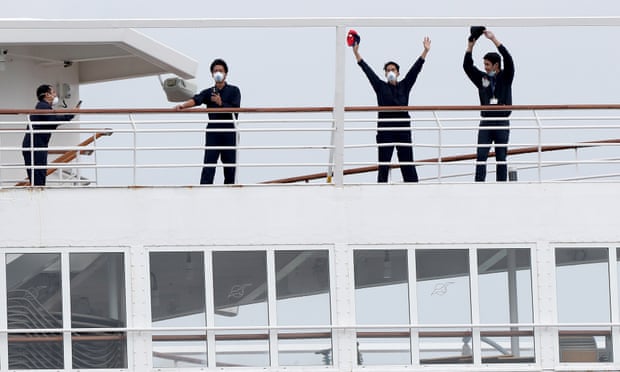100,000 cruise ship crew still trapped onboard due to COVID-19

While most cruise ship passengers have now made it back to land, another crisis has been growing – with no safe haven in sight.
Around the world, more than 100,000 crew workers are still trapped on cruise ships, at least 50 of which have Covid-19 infections. They are shut out of ports and banned from air travel that would allow them to return to their homes, according to The Guardian.
Many of these crew are quarantined in tiny cabins, and some have had their pay cut off. They have in effect become a nation of floating castaways, marooned on boats from the Galapagos Islands to Dubai port.
Many of the crew have only minimal communication with the outside world, making their situations hard to scrutinise. But at least 17 cruise ship workers are confirmed to have died from suspected Covid-19, and dozens more have had to be evacuated from ships and taken to hospital.
“We all have family, we all want to go home,” said one crew member who has been isolating in his cabin onboard the MSC Seaview off South America for nearly a month, but is no longer being paid.
The worker, who spoke via the internet and asked not to be named for fear of losing his job, said crew were initially allowed to move about the ship freely, but have been told to remain in their cabins since a worker who had already left the ship tested positive for Covid-19.
“We have not received any information about when we’re going home or what they are doing to get crew members home,” said the worker. “We are just in the cabin like prisoners.”
A spokesperson for MSC cruises said: “MSC Cruises has taken the difficult decision to temporarily suspend its cruise ship operations. As this health crisis has caused all our ships globally to stop operating, we have temporarily agreed to relieve the majority of our crew from their duties and are working to identify and pay for flight tickets for each and every one to safely return home for the duration of the temporary suspension of ships’ operations.
“We are offering all those who remain on board full board and lodging free of charge, assigning each of them a guest cabin for individual use. We’ve upgraded our menus, and are providing complimentary internet.”
Most industry workers hail from developing countries such as the Philippines, Indonesia and India and generally earn between $1,000–$2,000 (£800- £1,600) a month for working seven days a week, according to Ross Klein, a professor at St John’s College in Newfoundland who has written four books on the cruise industry.
At least one cruise line has stopped paying some workers who are trapped onboard, reports The Guardian.
Those who died in April include two housekeeping staff, a bartender and a security guard who were evacuated from ships in Florida. An Italian ship’s doctor died in Brazil after being taken by ambulance from the Costa Fascinosa cruise ship, and an engine worker on the Antarctic cruise ship Greg Mortimer died in Uruguay after 128 of the 217 people onboard tested positive for coronavirus.
Yet many nations, including the US, have baulked at providing even basic emergency services for these stranded crew members.
“Some of these crews are in a no man’s land,” said John Hickey, a maritime lawyer. He said crew members did not have access to the rights afforded by their nations of citizenship, yet they were often outside the jurisdiction of the countries where their ships were sailing.
Most of the cruise companies are registered in low-tax, low-regulation nations such as Panama or Liberia, with their ships flying the flags of territories such as the Bahamas or Bermuda, which are not prepared to care for thousands of sick crew.
Read the full article online.










